Breakfast in Japan: What & Where to Eat
When traveling in Japan, visitors may wonder what to eat for breakfast and where since going out for the first meal of the day does not seem common in Japanese culture. Since it is a meal we take seriously, we put together this guide about the breakfast scene in this country. In this post, we will explain different breakfast options in Japan, from a quick bite to a substantial meal, and where you can find these options.
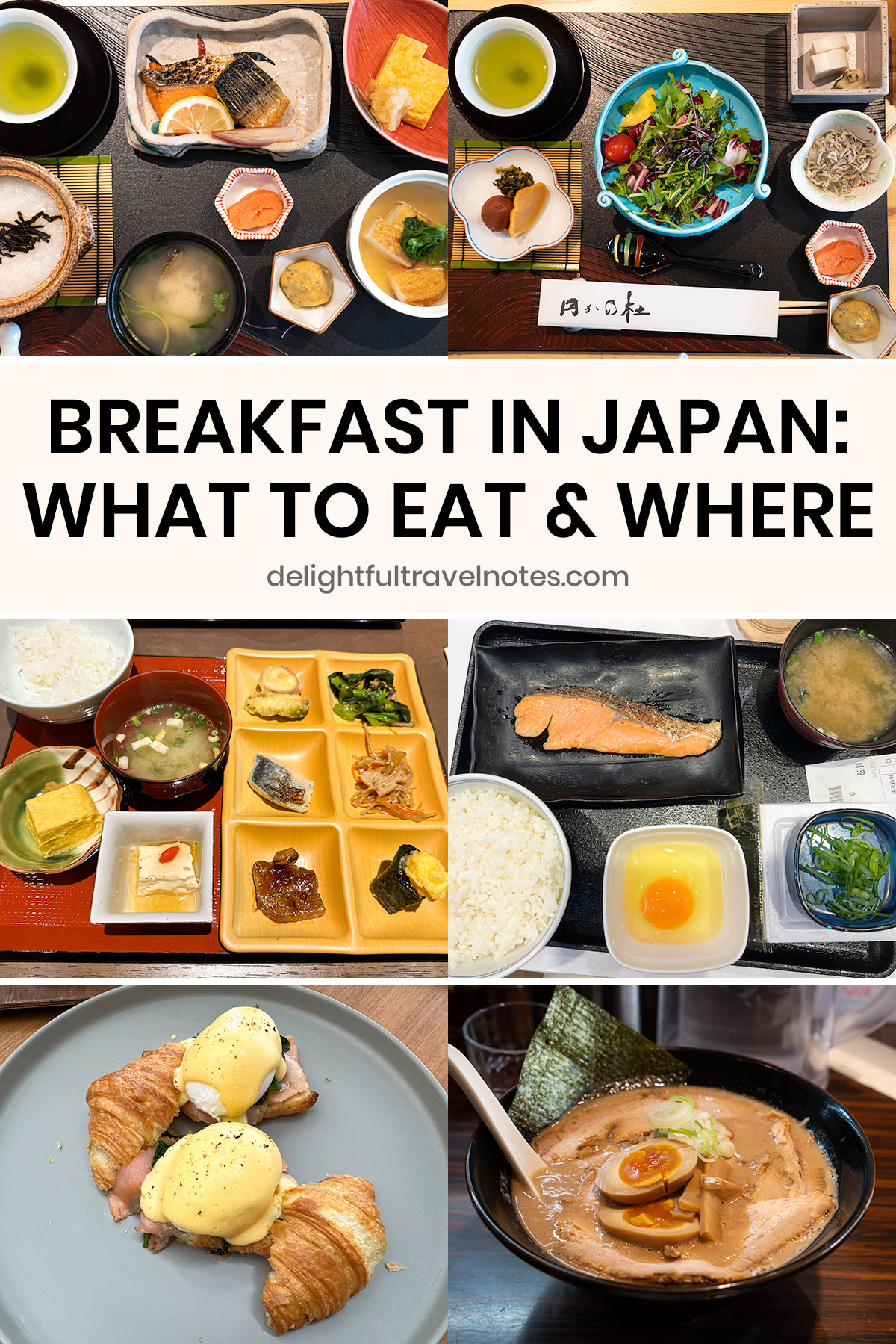
Traditional Japanese Breakfast
Significantly different from Western-style breakfast, traditional Japanese breakfast follows the traditional meal composition known as ichi-ju san-sai, which means “one soup, three dishes“. Typical elements of this balanced meal Japanese people eat in the morning are:
- Rice
- Miso soup
- Grilled fish such as salmon or mackerel
- Pickles such as cucumber, plums, and radishes
- Other possible dishes include natto (fermented soybeans), raw egg (to put on rice), and tamagoyaki (rolled omelet)
Going out for breakfast isn’t as common in Japan as in some other Asian and Western cultures. Traditionally, Japanese people prepare and eat it at home, and most food outlets don’t open until 10 or 11 in the morning.
In case you want to read more about traditional Japanese meals, I highly recommend the Japanese Cooking: A Simple Art cookbook, and Washoku: Recipes from the Japanese Home Kitchen is also a good book.
Alternative Choices
Western-style breakfast foods, like bread, pastries, eggs, and cereals, are also available. In larger cities, for example, you can find Western-style bakeries, pancake houses, and coffee shops. Convenience stores also provide a wide range of quick options, such as onigiri (rice balls) and sandwiches. We’ll get more into this later in the post.
Where to Eat Breakfast in Japan
Now that you have known the available options, let’s move on to the next question: where to have breakfast. Travelers, especially first-timers and early-risers, may particularly care about this, and don’t worry, we’ve got you covered. We personally enjoy and recommend a Japanese breakfast. In case you are not interested, we also have other suggestions for the first meal of the day below.
Hotels
Hotels are often the most convenient choice for breakfast, though the quality, price and selection can vary. Japanese hotels usually have a strong emphasis on Japanese breakfast, and it can be in the form of a breakfast set or a breakfast buffet.
I actually don’t mind having a Japanese breakfast set over buffet. The food is often beautifully presented, freshly prepared, and the portions are enough to keep us active until lunch time. Here’s our breakfast set at The Thousand Kyoto (I adore this hotel!).
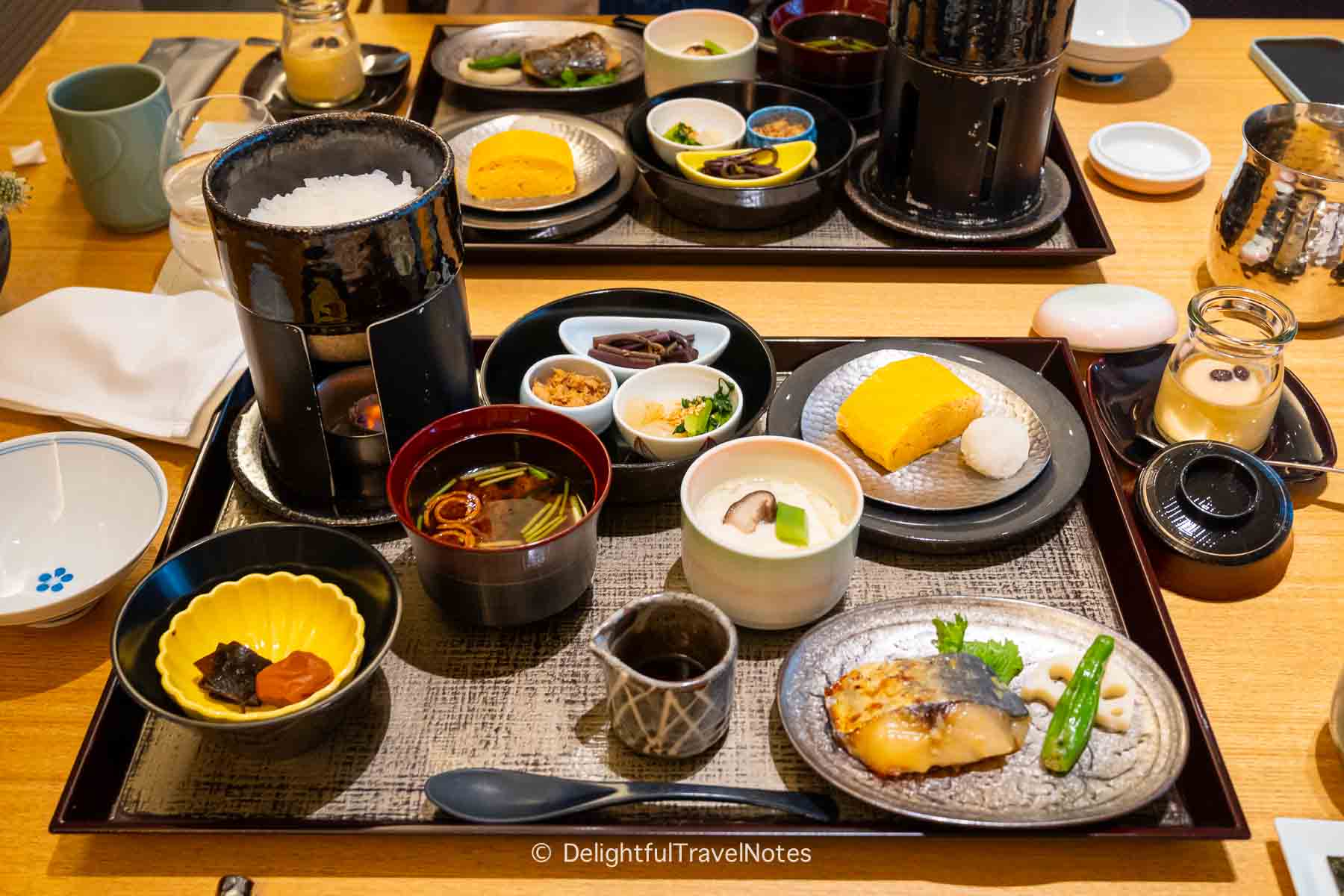
Here’s the traditional Japanese breakfast set at Dai-ichi Tokyo Hotel:
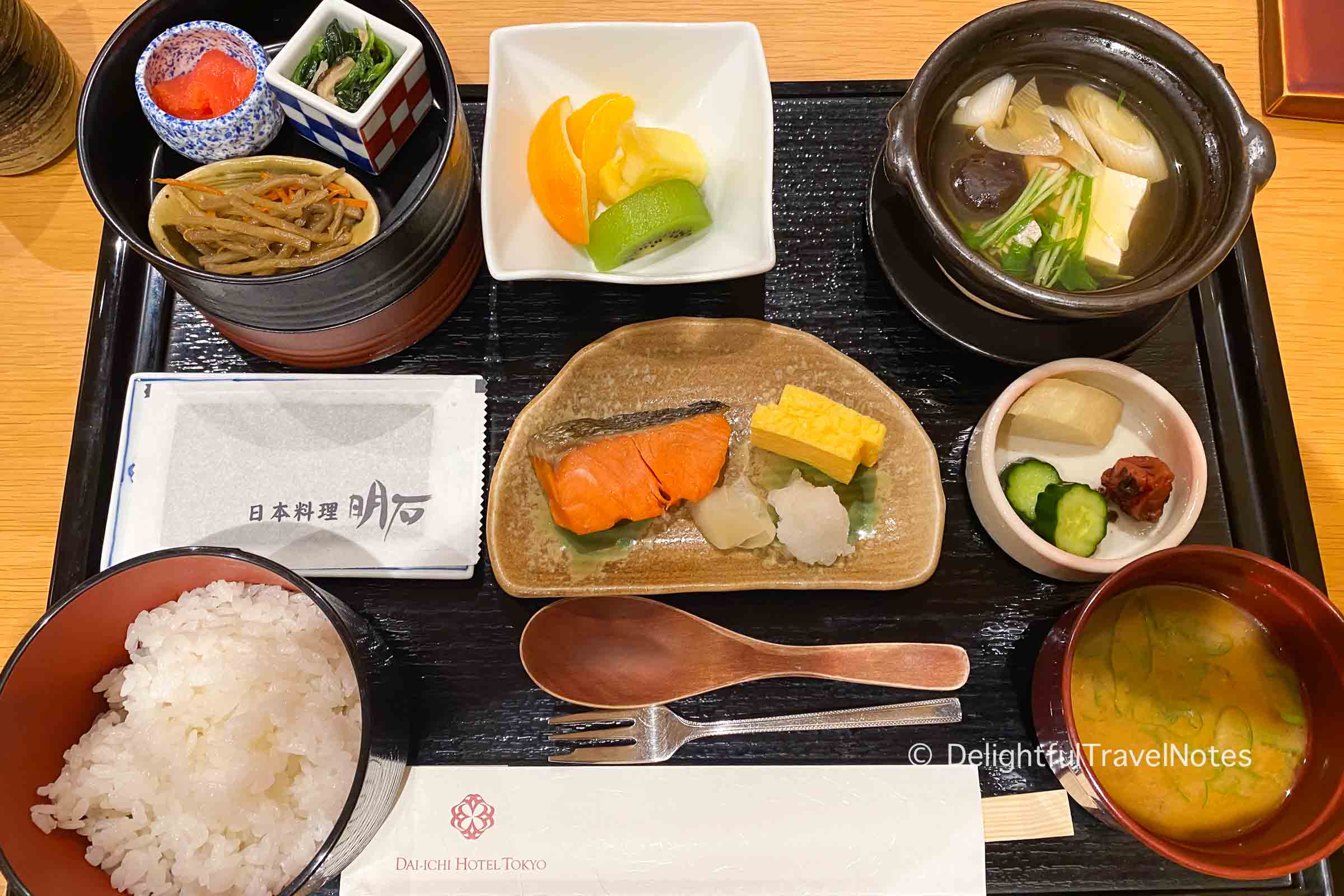
Our stay at the Celestine Hotel Gion Kyoto (here’s my full review of this hotel), which is under the Japanese hotel chain Mitsui, included a morning buffet with mostly Japanese dishes. We were able to compose a substantial Japanese-style meal with rice, miso soup, pickles and dishes such as tamagoyaki, grilled mackerel, vegetable tempura and braised pork belly.
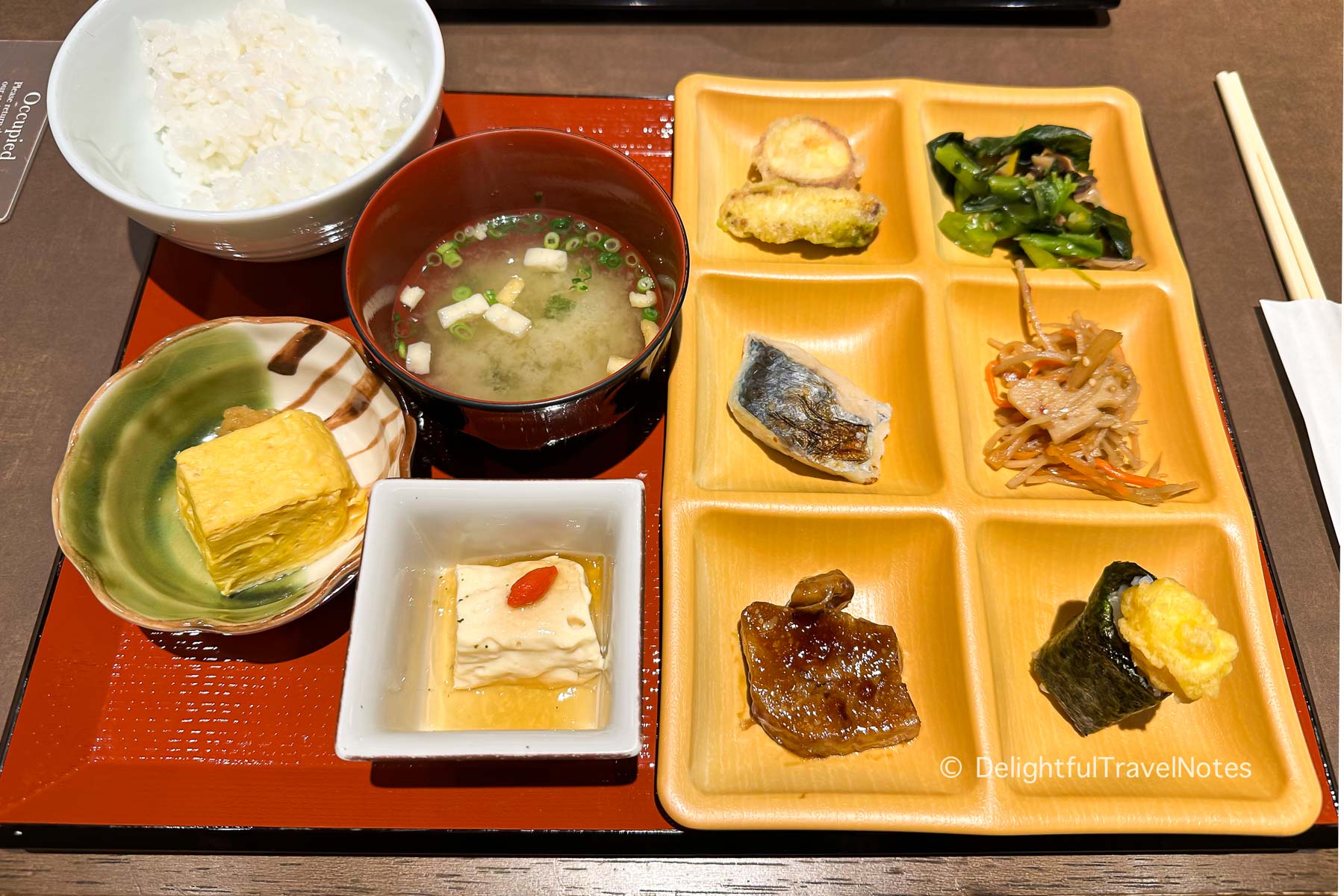
International hotel chains seem to lean heavily towards Western-style offerings, with a range of continental and American favorites such as cereals, bread, eggs, bacon, fruits, and yogurt. Bread choices are usually quite limited though.
I haven’t seen a breakfast buffet at any of the Western hotels we’ve stayed at in Japan that impressed me. They often feel commercially made without enough attention to details. The one at the Hilton Osaka was just okay, while the one at the Swissotel Osaka left a lot to desire. Even the pickled plum (umeboshi) tasted bad and the fruits were inedible, tasting like they came from a can.
We opted for a la carte dishes on a few days when we stayed at the Hyatt Regency Hakone and Hyatt Centric Ginza. They were okay, but generally just uninteresting and unremarkable.
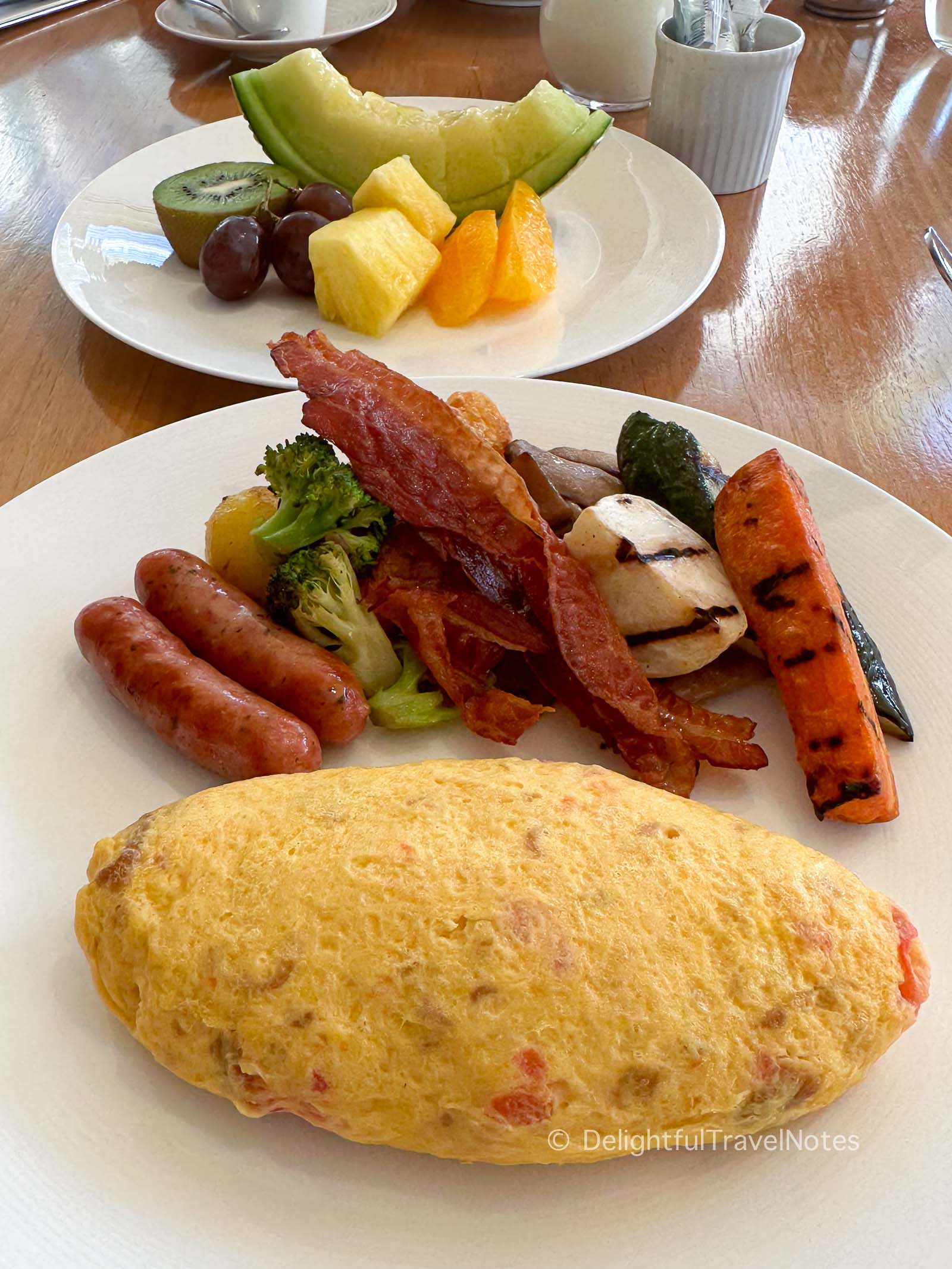
Another thing to note is even though Japan produces excellent fruits, you may not see fruits in hotel breakfasts. If there are, they are usually pretty… low quality.
Ryokan
For those seeking an authentic, impressive, and delightful experience, we highly recommend a stay at a ryokan (traditional Japanese inn) with kaiseki dinner and full breakfast. Breakfast at a ryokan is an affair to remember, carefully crafted and elegantly presented with a variety of dishes featuring local and seasonal ingredients. Some ryokan offer both traditional Japanese as well as Western options.
We stayed at Madoka no Mori ryokan in Hakone, and their breakfast was delicious and substantial without being overly heavy. The food was thoughtfully prepared to provide a balance of flavors, textures, and colors. It was definitely the best morning meal in our Japan trip.
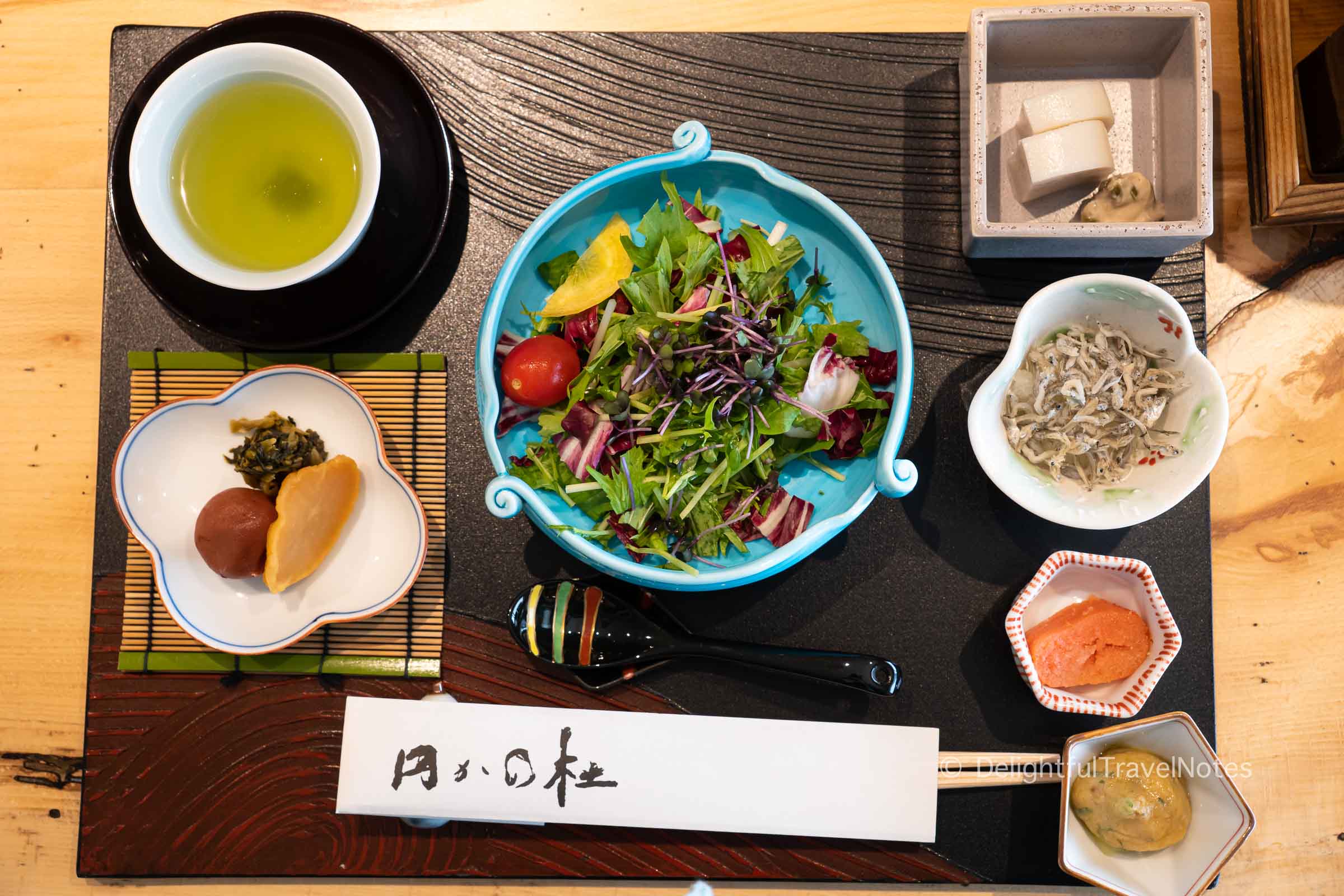
We started with a refreshing bowl of salad. The meal then continued with rice (or porridge), grilled fish, miso soup and a variety of small dishes such as tamagoyaki, mentaiko, simmered tofu and steamed vegetables. We ended the meal with fresh fruits and green tea.
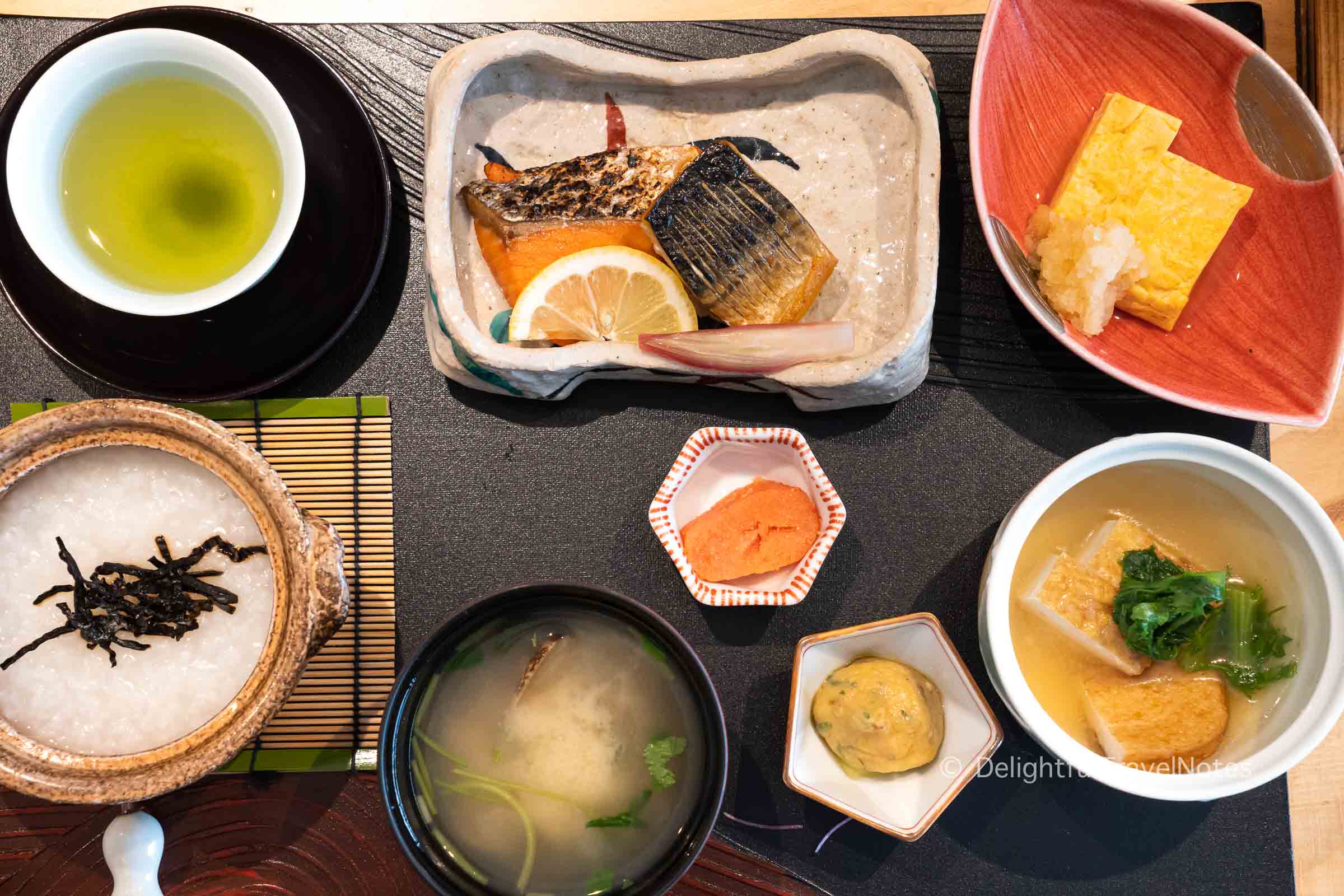
You can read our detailed review of Madoka no Mori ryokan in Hakone here.
Gyudon Chains and Curry Chains
Gyudon (beef bowl) chains such as Yoshinoya, Sukiya, and Matsuya provide convenient and affordable breakfast options. Some locations open 24 hours, while some open as early as 7-8 am. While gyudon is their specialty, these chains also offer morning meal sets that include traditional items like grilled fish and miso soup. Check Yoshinoya morning set menu here. A couple locations of Coco Ichibanya curry chain in Tokyo also open 24 hours.
We ordered two meal sets at Yoshinoya, each cost around 600 yen. One included rice, miso soup, salad, grilled salmon and a small bowl of simmered beef. The other one consisted of rice, miso soup, grilled salmon, a raw egg and natto. Inside the restaurant were Japanese people having their first meal of the day before heading to work.
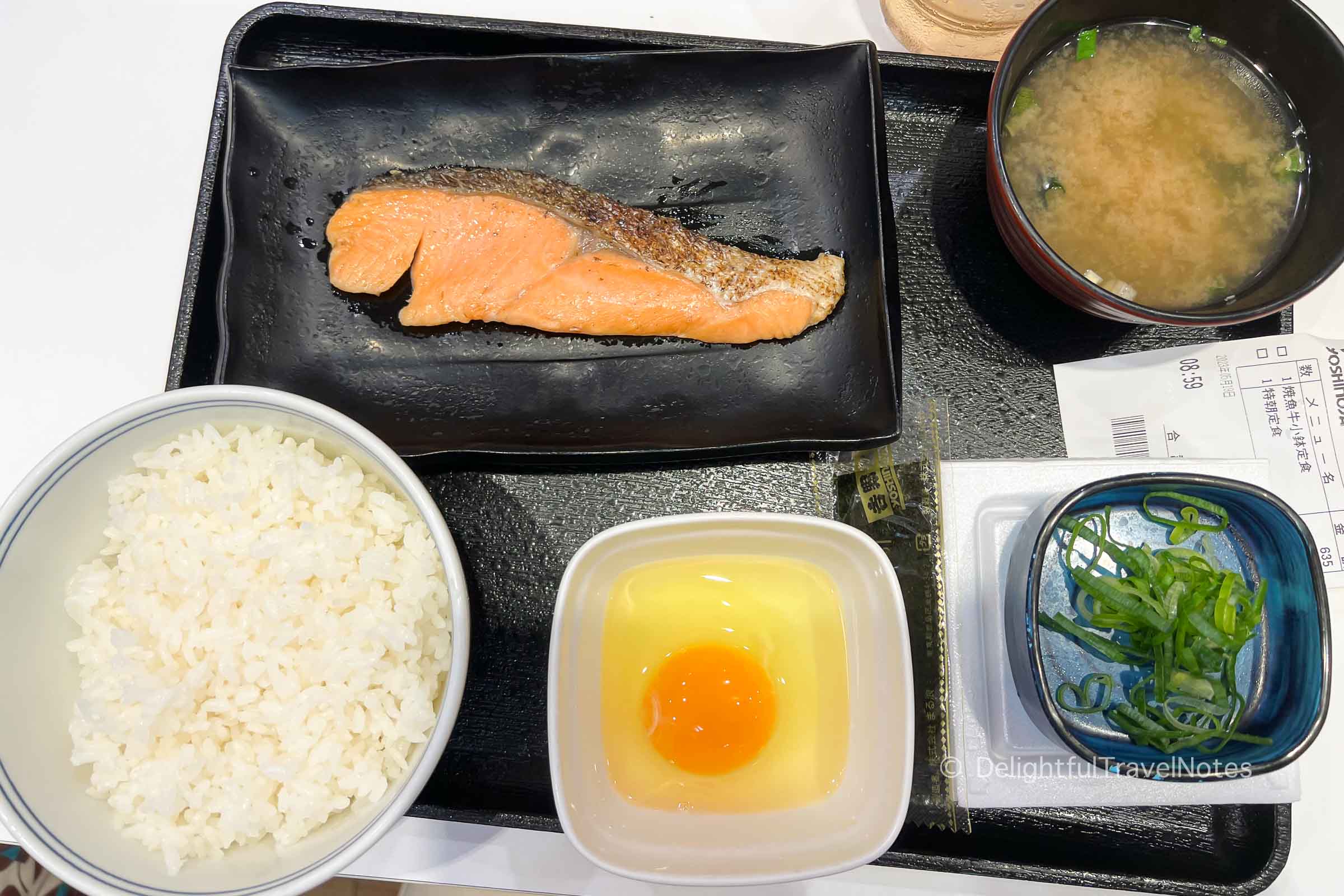
Noodle Shops
A hot and filling bowl of noodles may make a perfect start for a long day of exploration. You may be able to find some ramen or soba shops that open early, such as:
- Fuji Soba chains (many locations only close from 3-4 am).
- Ichiran ramen chains have several 24-hour locations. Some of their locations closes at 6 am, so if you have jet lag, it may not be a bad option.
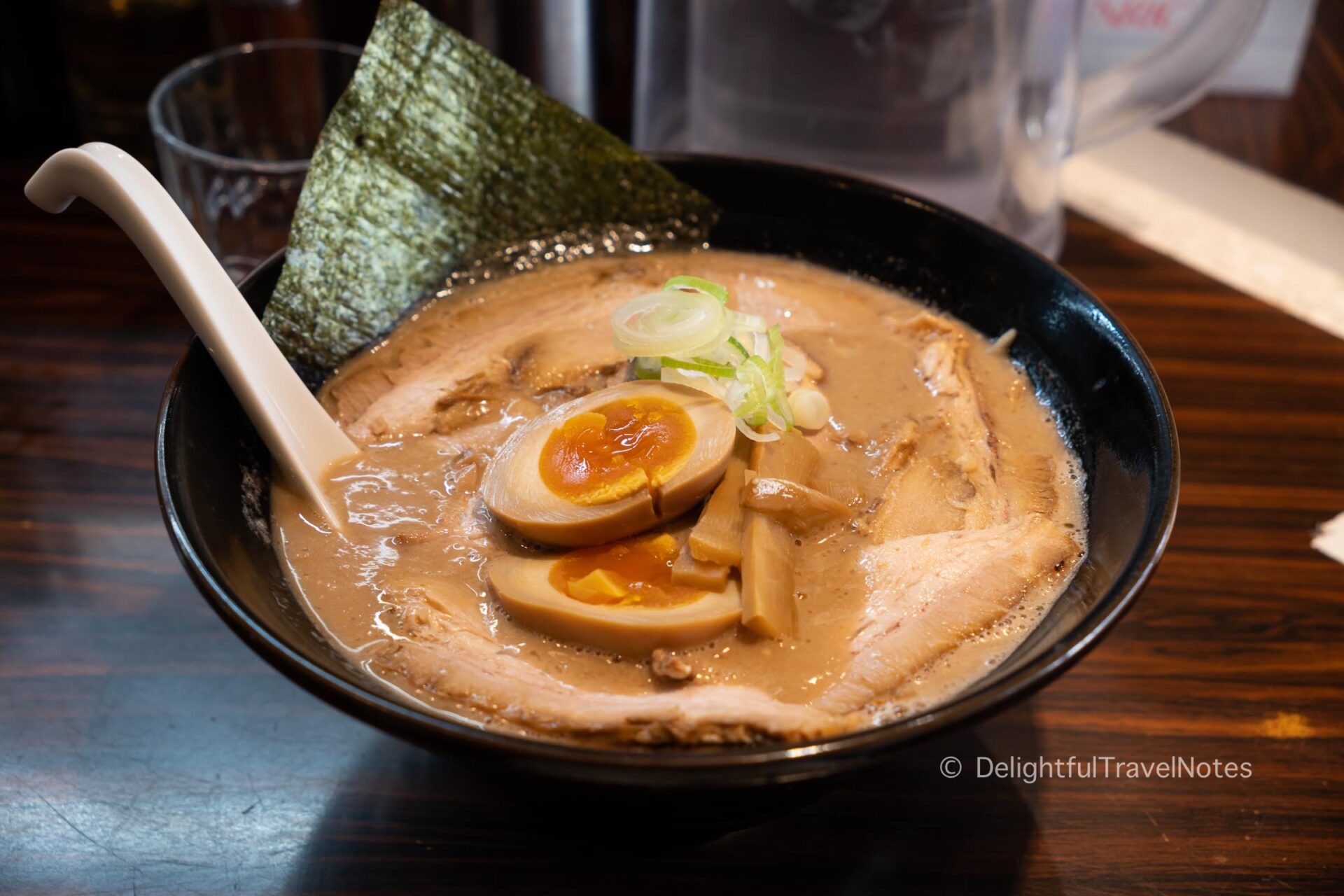
Convenience Stores
Don’t underestimate the humble konbini, or convenience stores, such as 7/11 and Family Mart. These 24-hour stores are everywhere in Japan and offer various ready-to-eat breakfast items such as onigiri (rice balls) and sandwiches. It’s a handy option for early risers or travelers needing a quick grab-and-go bite.
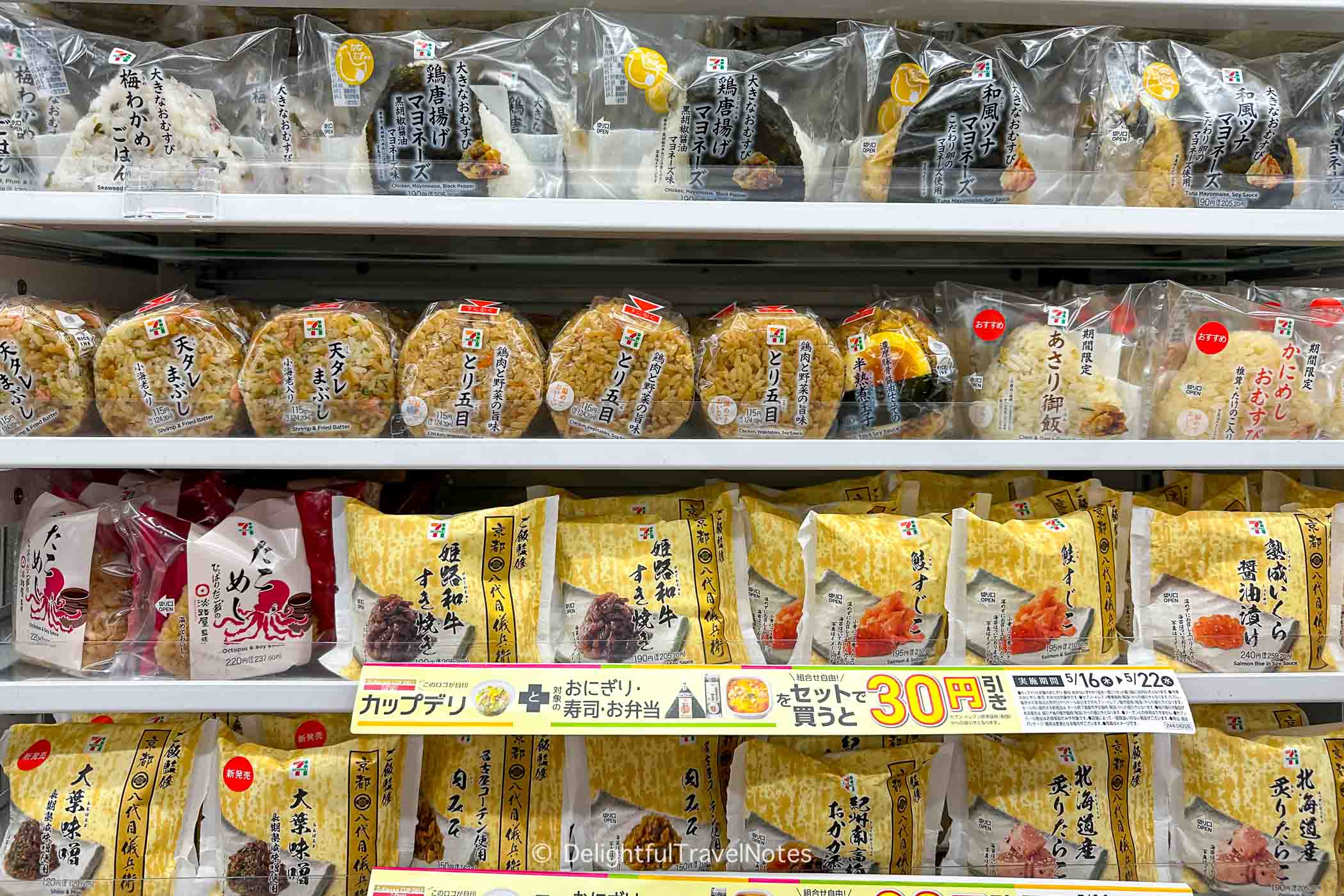
However, for those who prefer a proper hot savory breakfast like us, an onigiri or sandwich from convenience stores is not enough until lunch time. And after all, konbini food is still just fast food with average quality. It’s usually my last resort, perhaps for eating on an express train to the airport to catch an early morning flight.
You can also check large stations such as Tokyo station for bentos and restaurants that open early with morning sets.
Other Options
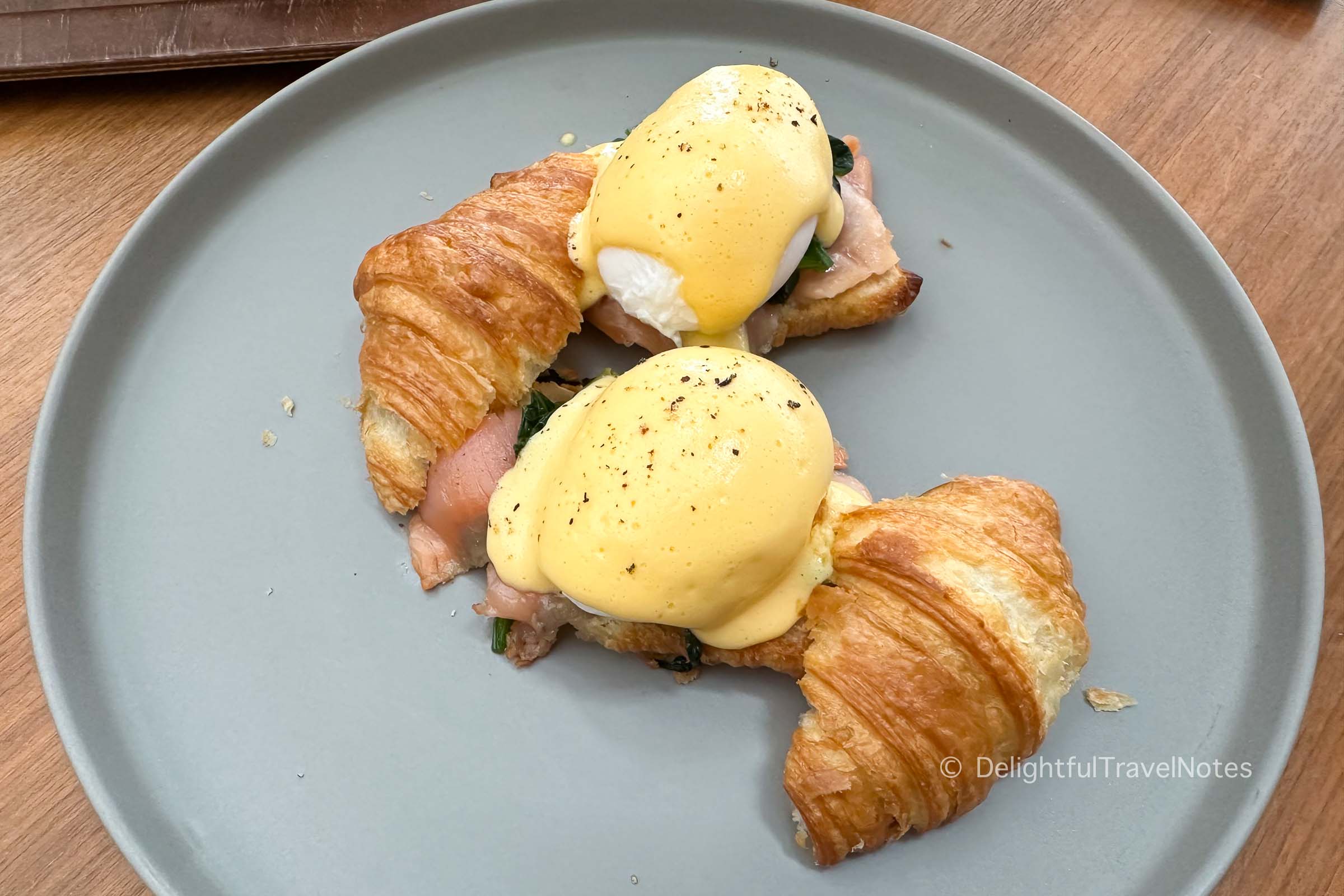
- For those craving a familiar Western breakfast, you can look for egg/pancake places in larger cities. For example: bills, Denny’s and Eggcellent. World Breakfast All Day may offer some interesting options.
- 24-hour eateries and some family-friendly restaurants that open early in the morning.
- Some cafes open early, serving not just coffee but also pastries and sandwiches that you can grab for a quick and simple option.
- Tsukiji Fish Market in Tokyo has a number of restaurants and shops that open early. We went there for a sashimi and sushi breakfast once, and there were all kinds of other food options too. Come early if you can because the lines can get really long.
Other Tips
Overall, there are a decent amount of breakfast choices in Japan. If you type “breakfast” into Google Maps, it will bring up a number of options for you. We stumbled upon some interesting places (Choshoku Kishin in Kyoto, and Tsumugi in Tokyo) when using this method, but didn’t have time to visit.
We hope our guide has shed some light on what’s for breakfast in Japan and where to eat it when traveling there. Enjoy your meal, whether it’s a traditional Japanese style, a fast-food set at a gyudon chain, or a quick onigiri from the konbini!
